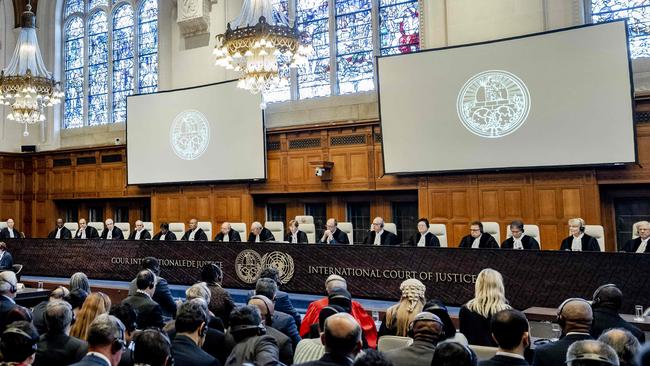
This much can be predicted with certainty about the International Court of Justice’s decision in the case South Africa brought against Israel: Hamas will completely ignore the court’s call for the “immediate and unconditional release” of the hostages it illegally holds captive. But while the court’s call is commendable, its decision is troubling.
To say that is not to overstate the significance of the provisional measures the court has ordered. Whatever the decision’s defects, those measures primarily require Israel to abide by its obligations under the Genocide Convention, which it insists it already does.
Moreover, what the court didn’t do is as significant as what it did. The court, South Africa demanded, should order Israel to “desist” from genocidal acts, implying Israel was committing genocide. Instead, the ICJ carefully restricted itself to saying Israel has an obligation to “prevent” genocidal acts from occurring, leaving the factual issue open.
Nor did the court accept South Africa’s central request, which was for an immediate ceasefire. In Ukraine v Russia (2022), the ICJ ordered Russia to “immediately suspend military operations in Ukraine”. This order makes it emphatically clear that the only military action it enjoins is that carried out with genocidal intent.
That leaves Israel free to continue its current campaign, knowing that, as the Convention’s drafters noted, “even heavy civilian losses in the course of operations of war do not as a rule constitute genocide”.

Unfortunately, all that has been overshadowed in the propaganda battle by the ICJ’s statement that some of South Africa’s claims are “plausible”.
The court has long held that it “may exercise its power to impose provisional measures only if (the claims) asserted by the party requesting such measures are plausible”. But as the German judge Georg Nolte points out, “the jurisprudence of the court is not entirely clear as to what ‘plausibility’ entails”.
In The Gambia v Myanmar (2020), which also involved allegations of genocide, the court determined that there had to be, even at the preliminary stage, “reasonable grounds” for inferring the respondent was acting “with genocidal intent”. However, this decision ignores that requirement, erasing the distinction between “not inconceivable” and “plausible”.
Nolte suggests that dramatic lowering of the threshold reflects the fact that the information South Africa provided was simply “not comparable” to that which the “reasonable grounds” test requires.

South Africa, Nolte argues, may have shown, by citing a few Israeli politicians’ incendiary statements, that Israel risks breaching the duty the Convention imposes to prevent incitement to genocide – just as that duty could be breached by Australia’s refusal to prosecute Muslim preachers who repeatedly call Jews vermin. But it would be ludicrous to claim that breach actually amounts to genocide.
The court was therefore unable to point to behaviour that might ultimately meet its test for genocide: a test that requires showing, “by evidence that is fully conclusive”, that “the only inference that could reasonably be drawn” from the respondent’s conduct is that it reflected a genocidal intent.
Instead, using a highly caveated formulation that does not appear in its previous decisions, it asserts that “at least some of the rights” South Africa claims need protection may be at risk, without ever saying which.
That is presumably why the court’s provisional orders fall far short of those it has imposed in comparable cases. But as Ugandan judge Julia Sebutinde says in her dissent, South Africa’s failure to show its claims have a real prospect of success must raise the question of why the court didn’t just dismiss the application, as one might normally expect a court to do.
According to Nolte, who, despite serious misgivings, supported the decision, the ICJ thought it could do some good without doing any harm. However, it may also be that the court’s outgoing American president, Joan Donoghue, wanted to maintain a degree of consensus by partially adopting South Africa’s rhetoric, regardless of the damage to Israel’s reputation.
That possibility needs to be viewed against the backdrop of the court’s evolution. When it was established in 1945, the ICJ was the only international body of its kind. Since then, nearly 30 international judicial bodies have been created, along with dozens that are quasi-judicial.
That trend, which is at least partly due to the ICJ’s flaws – including the lack of an appellate mechanism to discipline decisions and constrain judges who often come from authoritarian, low-quality legal systems – has been accompanied by a massive flight from its jurisdiction.
The share of states accepting the court’s mandatory jurisdiction has halved since 1950, with even the UK, which was the only one of the founding great powers that still accepted it, recently imposing stringent reservations on that jurisdiction’s scope. Meanwhile, the number of new treaties that grant the ICJ jurisdiction has collapsed.
The ICJ has responded by trying to make its jurisdiction more attractive, notably to the “global South”. In particular, since its Namibia opinion in 1971 and its Nicaragua decision in 1984, it has shown a greater willingness to involve itself in quintessentially political disputes and assess them in terms of “fairness”.
At the same time, it has made it easier for applicants to obtain preliminary measures, giving the impression every applicant gets something, while controversially deciding in 2001 that those measures, which were previously exhortatory, are binding.
The result is that provisional measures have proliferated: in the past decade alone, they have been imposed in 12 cases, as against 10 in the entire period from 1945 to 1995.
Last week’s decision simply accentuates that trend by yet again lowering the thresholds for asserting jurisdiction, establishing an applicant’s standing and imposing provisional measures. Moreover, by requiring Israel to report monthly, the ICJ has ensured the case will be continuously relitigated, dealing itself into a dispute it cannot possibly resolve.
None of that will be costless. Already, the compliance rate with the ICJ’s provisional measures has plummeted: excluding this decision, there was no compliance at all with its orders in four of the five cases decided since 2016, and only very limited, utterly ineffectual, compliance in the other.
That might not matter if the court retained the moral high ground, helping to guide world opinion. But it can hardly do so while continuously reducing its standards, making decisions increasingly ambiguous and opening an unbridgeable gulf between provisional orders and final judgments.
Rather, the ICJ’s growing activism will merely further discredit its jurisdiction and encourage the West’s shift to other adjudicative venues, with the risks that creates of conflicting law, jurisprudential overlap and rampant forum shopping.
Today’s international legal system is a very weak reed: it never has, and never will, live up to its founders’ utopian aspirations. But as the world becomes an ever more dangerous place, it deserves a better fate than this decision foreshadows – and a much wiser one too.






